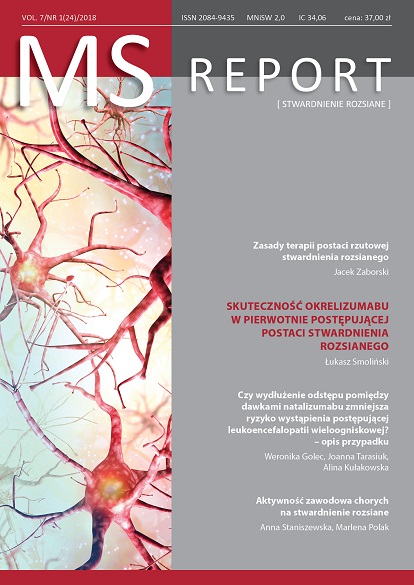Does extended interval of natalizumab dosing decrease the risk of progressive multifocal leukoencephalopathy? – case report Review article
Main Article Content
Abstract
Natalizumab, a humanized monoclonal antibody against the α4-integrin, has high efficacy in the treatment of relapsing-remitting multiple sclerosis. The drug is generally very well tolerated. However, the long-term therapy brings an increasing risk of developing progressive multifocal leukoencephalopathy, an opportunistic infection caused by the JC virus (JCV). The authors present a case of 53-year-old patient suffering from relapsing-remitting multiple sclerosis, with positive JCV serostatus, treated with natalizumab for 14 years. During natalizumab treatment disease activity was not observed. However, in the thirteenth year of therapy a sustained increase in the anti-JC antibody index from 0.72 to 1.31 was noticed. In order to minimize the risk of side effects of treatment, radiological monitoring was intensified and the strategy of extended interval of drug dosing was introduced – the interval between consecutive doses of natalizumab was prolonged from 4 to 6 weeks. The modification of treatment schedule did not affect the high effectiveness of therapy. Within 12 months from the prolongation between drug doses there were no relapses, no disability progression and no active demyelinating lesions observed in regularly performed magnetic resonance imaging of the brain. But, it was found a decrease in the anti-JCV antibody index in patient’s serum to a safe value of 0.77.
Article Details
Copyright © by Medical Education. All rights reserved.
References
2. Dargahi N., Katsara M., Tselios T. et al.: Multiple sclerosis: Immunopathology and treatment update. Brain Sci. 2017; 7(7). DOI: 10.3390/brainsci7070078.
3. Polman C.H., O’Connor P.W., Havrdova E. et al.: A randomized, placebo-controlled trial of natalizumab for relapsing multiple sclerosis. N. Engl. J. Med. 2006; 354(9): 899-910.
4. Rudick R.A., Stuart W.H., Calabresi P.A. et al.: Natalizumab plus Interferon Beta-1a for Relapsing Multiple Sclerosis. N. Engl. J. Med. 2006; 354(9): 911-923.
5. Steiner D.: Natalizumab versus placebo in patients with secondary progressive multiple sclerosis (SPMS): results from ASCEND, a multicenter, double-blind, placebo-controlled, randomized phase 3 clinical trial [paper presented at: American Academy of Neurology 2016 Annual Meeting; 2016; Vancouver, BC. Canada].
6. Ratchford J.N., Brock-Simmons R., Augsburger A. et al.: Multiple sclerosis symptom recrudescence at the end of the natalizumab dosing cycle. Int. J. MS Care 2014; 16(2): 92-98.
7. Bomprezzi R., Pawate S.: Extended interval dosing of natalizumab: A two-center, 7-year experience. Ther. Adv. Neurol. Disord. 2014; 7(5): 227-231.
8. Zhovtis Ryerson L., Frohman T.C., Foley J. et al.: Extended interval dosing of natalizumab in multiple sclerosis. J. Neurol. Neurosurg. Psychiatry 2016; 87(8): 885-889.
9. Havrdova E., Galetta S., Hutchinson M. et al.: Effect of natalizumab on clinical and radiological disease activity in multiple sclerosis: a retrospective analysis of the Natalizumab Safety and Efficacy in Relapsing-Remitting Multiple Sclerosis (AFFIRM) study. Lancet Neurol. 2009; 8(3): 254-260.
10. O’Connor P., Goodman A., Kappos L. et al.: Long-term safety and effectiveness of natalizumab redosing and treatment in the STRATA MS study. Neurology 2014; 83(1): 78-86.
11. Hunt D., Giovannoni G.: Natalizumab-associated progressive multifocal leucoencephalopathy: A practical approach to risk profiling and monitoring. Pract. Neurol. 2012; 12(1): 25-35.
12. Tysabri (natalizumab) Benefit/Risk Update, September 2017, Biogen Information Materials.
13. McGuigan C., Craner M., Guadagno J. et al.: Stratification and monitoring of natalizumab associated progressive multifocal leukoencephalopathy risk: Recommendations from an expert group. J. Neurol. Neurosurg. Psychiatry 2016; 87(2): 117-125.
14. Sheremata W.A., Vollmer T.L., Stone L.A. et al.: A safety and pharmacokinetic study of intravenous natalizumab in patients with MS. Neurology 1999; 52(5): 1072-1074.
15. Rudick R.A., Sandrock A.: Natalizumab: α4-integrin antagonist selective adhesion molecule inhibitors for MS. Expert Rev. Neurother. 2004; 4(4): 571-580.
16. Berkovich R., Togasaki D.M., Cen S.Y., Steinman L.: CD4 cell response to interval therapy with natalizumab. Ann. Clin. Transl. Neurol. 2015; 2(5): 570-574.
17. Brandstadter R., Katz Sand I.: The use of natalizumab for multiple sclerosis. Neuropsychiatr. Dis. Treat. 2017; 13: 1691-1702.

